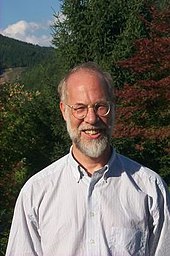Life and work
Kreck grew up as the son of the theologian Walter Kreck [ de ] in Herborn and studied mathematics and physics from 1966 to 1970, and business administration at the Universities of Bonn, Berlin and Regensburg. In 1970 he submitted his diploma in Mathematics in Bonn and in 1972 he received his doctorate there under the supervision of Friedrich Hirzebruch, with a thesis titled An invariant for stably parallelized manifolds. From 1972 to 1976 he studied Protestant theology in Bonn: in a similar period he was also assistant from 1970 to 1976 to professor Hirzebruch. In 1977 he completed his habilitation in Bonn in Mathematics, titled Bordism groups of diffeomorphisms. In 1976 he became professor at the University of Wuppertal and in 1978 he moved to the University of Mainz. From 1994 to 2002 he was director of the Oberwolfach Research Institute for Mathematics. In 1999 he became professor at the University of Heidelberg. From 2007 until October 2011 he was the founding director of the Hausdorff Research Institute for Mathematics at the University of Bonn. In 1981/82 and from 1989 to 1992 he was visiting professor at the Max Planck Institute for Mathematics in Bonn. He was also a guest researcher at places including Paris, Princeton, Berkeley, Chicago, Aarhus, St. Petersburg, Moscow and Beijing.
Kreck worked on the classification of manifolds in differential topology (e.g. bordism groups), [1] 4-manifolds with exotic differentiable structure and the interaction of differential geometry and topology. In his habilitation in 1977 he managed the complete classification of closed smooth manifolds with diffeomorphisms up to bordism: a problem that had already been worked on by René Thom, William Browder and Dennis Sullivan. Building on this work he developed a modified theory of surgery which is applicable under weaker conditions than classical surgery and he applied this theory to solve outstanding questions in differential geometry. In the 2000s (decade), he considered examples of asymmetric topological manifolds, finding the first example of such a manifold with trivial fundamental group.
From 1990 to 1998 he was an editor of Mathematische Annalen and from 1998 to 2002 for Archiv der Mathematik. Since 2000 he has been a member of the Heidelberg Academy of Sciences. In 2003 he was made an honorary doctor of the University of Siegen. [2] In 2010 he was awarded the Cantor Medal. In 2012 the German Mathematical Society awarded him a Gauss Lectureship. In 2023, he was elected as a corresponding member of the Göttingen Academy of Sciences and Humanities. [3]
Among his PhD students is Peter Teichner, [4] presently a Director of the Max Planck Institute for Mathematics in Bonn.
In February 2011 following the Guttenberg plagiarism scandal, he initiated a "declaration of university professors on academic standards" [5] and the accompanying petition. The original signatories included, e.g. Martin Carrier [ de ], Eckhard Freise [ de ], Gerhard Huisken and Werner Nahm.
In his spare time he plays the cello.

In mathematics, differential topology is the field dealing with the topological properties and smooth properties of smooth manifolds. In this sense differential topology is distinct from the closely related field of differential geometry, which concerns the geometric properties of smooth manifolds, including notions of size, distance, and rigid shape. By comparison differential topology is concerned with coarser properties, such as the number of holes in a manifold, its homotopy type, or the structure of its diffeomorphism group. Because many of these coarser properties may be captured algebraically, differential topology has strong links to algebraic topology.

Friedrich Ernst Peter Hirzebruch ForMemRS was a German mathematician, working in the fields of topology, complex manifolds and algebraic geometry, and a leading figure in his generation. He has been described as "the most important mathematician in Germany of the postwar period."

The Max Planck Institute for Mathematics is a research institute located in Bonn, Germany. It is named in honor of the German physicist Max Planck and forms part of the Max Planck Society (Max-Planck-Gesellschaft), an association of 84 institutes engaging in fundamental research in the arts and the sciences. The MPIM is the only Max Planck institute specializing in pure mathematics.
In mathematics, a Hilbert manifold is a manifold modeled on Hilbert spaces. Thus it is a separable Hausdorff space in which each point has a neighbourhood homeomorphic to an infinite dimensional Hilbert space. The concept of a Hilbert manifold provides a possibility of extending the theory of manifolds to infinite-dimensional setting. Analogous to the finite-dimensional situation, one can define a differentiable Hilbert manifold by considering a maximal atlas in which the transition maps are differentiable.

Victor Matveevich Buchstaber is a Soviet and Russian mathematician known for his work on algebraic topology, homotopy theory, and mathematical physics.

William Browder is an American mathematician, specializing in algebraic topology, differential topology and differential geometry. Browder was one of the pioneers with Sergei Novikov, Dennis Sullivan and C. T. C. Wall of the surgery theory method for classifying high-dimensional manifolds. He served as president of the American Mathematical Society until 1990.
In mathematics, specifically geometric topology, the Borel conjecture asserts that an aspherical closed manifold is determined by its fundamental group, up to homeomorphism. It is a rigidity conjecture, asserting that a weak, algebraic notion of equivalence should imply a stronger, topological notion.
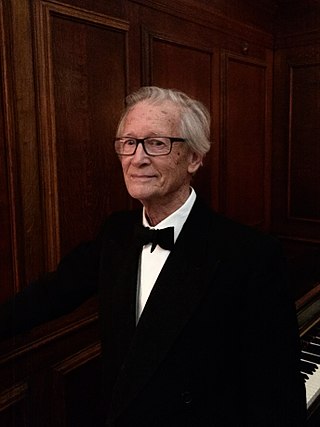
Dennis Barden is a mathematician at the University of Cambridge working in the fields of geometry and topology. He is known for his classification of the simply connected compact 5-manifolds and, together with Barry Mazur and John R. Stallings, for having proved the s-cobordism theorem. Barden received his Ph.D. from Cambridge in 1964 under the supervision of C. T. C. Wall.
In mathematics, specifically geometry and topology, the classification of manifolds is a basic question, about which much is known, and many open questions remain.
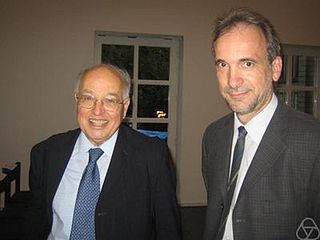
Hans Werner Ballmann is a German mathematician. His area of research is differential geometry with focus on geodesic flows, spaces of negative curvature as well as spectral theory of Dirac operators

Werner Müller is a German mathematician. His research focuses on global analysis and automorphic forms.
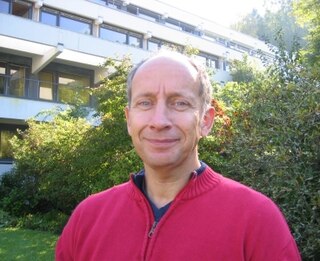
Wolfgang Lück is a German mathematician who is an internationally recognized expert in algebraic topology.
In differential topology, a branch of mathematics, a stratifold is a generalization of a differentiable manifold where certain kinds of singularities are allowed. More specifically a stratifold is stratified into differentiable manifolds of (possibly) different dimensions. Stratifolds can be used to construct new homology theories. For example, they provide a new geometric model for ordinary homology. The concept of stratifolds was invented by Matthias Kreck. The basic idea is similar to that of a topologically stratified space, but adapted to differential topology.
Ruth Kellerhals is a Swiss mathematician at the University of Fribourg, whose field of study is hyperbolic geometry, geometric group theory and polylogarithm identities.
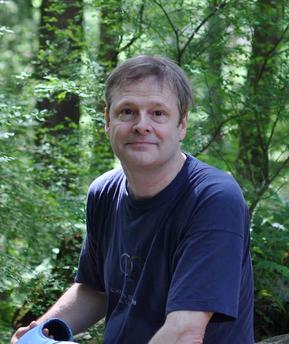
Thomas "Tim" Daniel Cochran was a professor of mathematics at Rice University specializing in topology, especially low-dimensional topology, the theory of knots and links and associated algebra.
Dieter Kotschick is a German mathematician, specializing in differential geometry and topology.

Thomas Schick is a German mathematician, specializing in algebraic topology and differential geometry.
Erhard Scholz is a German historian of mathematics with interests in the history of mathematics in the 19th and 20th centuries, historical perspective on the philosophy of mathematics and science, and Hermann Weyl's geometrical methods applied to gravitational theory.

Peter Teichner is a German mathematician and one of the directors of the Max Planck Institute for Mathematics in Bonn. His main areas of work are topology and geometry.

Dan Burghelea is a Romanian-American mathematician, academic, and researcher. He is an Emeritus Professor of Mathematics at Ohio State University.
